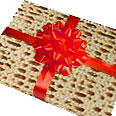
In her verdict, the judge ruled that, by law, a store or restaurant is not deemed a ‘public place’ because, unlike an open market, it is a closed off arena that cannot be seen by passersby.
State prosecutors maintained that “In a city like Jerusalem, most of whose population is not only Jewish but religious, common decency and mutual respect demand that this law be enforced. Furthermore the display and sale of bread and leavened goods is permitted during Passover in the city’s Arab neighborhoods.”
Attorneys for the defendants conversely maintained that the indictments ought to be dropped, especially seeing that similar indictments had never been issued.
The letter of the law
The judge noted in her verdict that “the Passover Law" is a religiously-based law, whose significance is symbolic and is not intended to formally entrench Halacha as Israeli law. It does not relate to all leavened goods, but to those products that are most obviously leavened such as breads, rolls, cakes, etc.
Furthermore, noted Bar Asher, “the law deals mainly with the prohibition on displaying leavened goods during Passover, rather than eating or possessing such products. In other words, its intent is to prevent the display of leavened goods in public during the holiday rather than their sale.”
Stores or restaurants, said the judge, do not meet the criteria of a public arena, because although outside our homes, they do not meet the dictionary or legal definition of a public place.
The judge thus ruled that “the four restaurant owners who were indicted for displaying leavened goods in public in essence did not violate any law, because a grocery store or restaurant is not by definition a public place. “
Last year: Fierce protests during Passover
Last year during Passover, haredim held fierce protests outside the aforementioned Jerusalem restaurants that were convicted of selling leavened goods. A peaceful recital of Psalms by the religious protestors unfortunately soon escalated into a full blown war of words between the haredi protestors and secular restaurant goers enjoying their pizzas and burgers.
“Whoever eats leavened goods during Passover deserves death under Jewish law,” yelled the haredim. To that the secular diners replied with a “shame on you,” and “why don’t you go and serve in the IDF”
One restaurant owner noted that “there were plenty of demonstrations last year. One rabbi lay on the floor and began to cry. It was a very unpleasant scene. We did not give in, however. Passover is the time when our business is strongest. We are happy about the court’s ruling and will continue to do our best to please our customers.”















